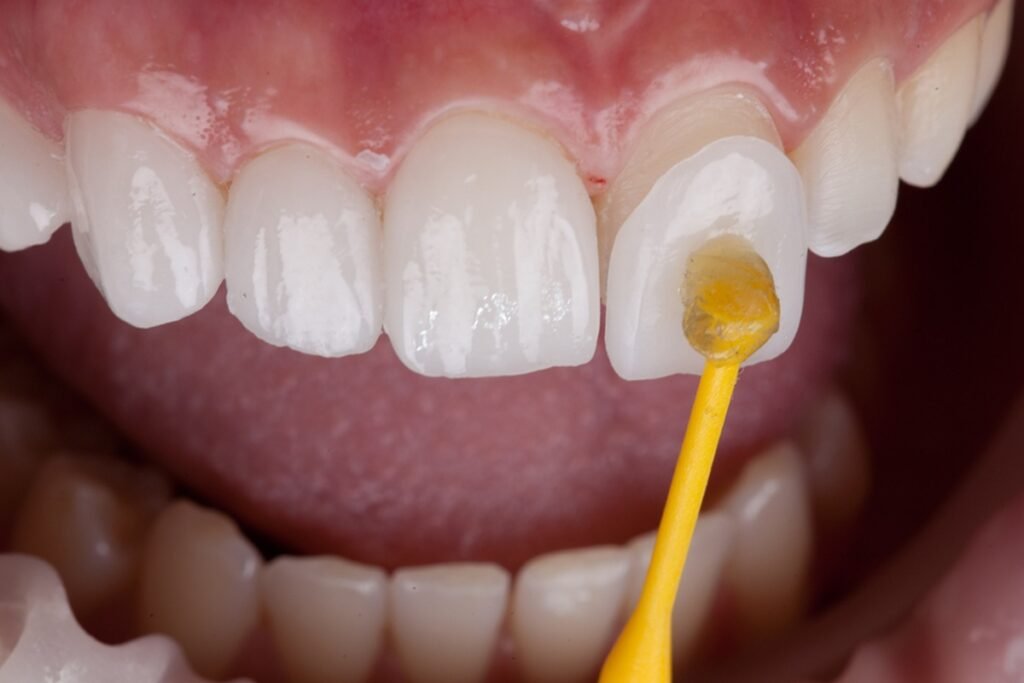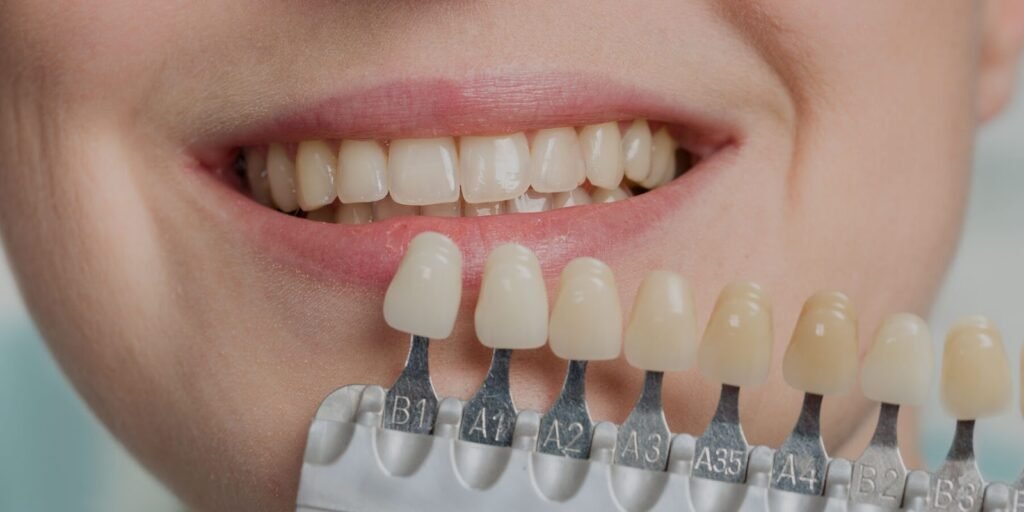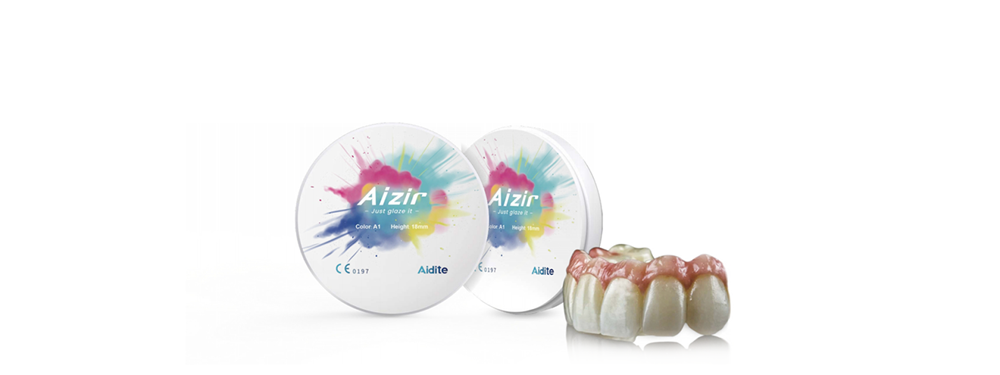
Dental veneers are a transformative cosmetic dentistry solution. They offer a quick and effective way to achieve a radiant, symmetrical smile.
Whether you’re addressing crooked teeth, gaps, stains, or chips, this guide covers what dental veneers are, their types and costs, and how advanced materials like Aidite’s zirconia products elevate their performance.
What Are Dental Veneers?
Dental veneers are thin, custom-made shells designed to cover the front surface of teeth, enhancing their appearance. These materials are typically made from porcelain or zirconia and provide natural aesthetics and long-lasting durability. Veneers are an excellent solution for various cosmetic concerns and can significantly improve the overall look of your smile. They can address issues such as:
- Crooked or Misaligned Teeth
- Gaps Between Teeth (Diastema)
- Tooth Discoloration or Stains
- Chipped, Cracked, or Uneven Teeth
- Worn Down or Uneven Edges
By enhancing the appearance of your teeth, veneers can provide a radiant, symmetrical smile that boosts confidence.
Types of Dental Veneers
Choosing the right dental veneer depends on your aesthetic goals, budget, and durability needs. Each type of veneer has unique characteristics, advantages, and drawbacks.
1. Porcelain Veneers
Porcelain veneers are made from high-quality ceramic, providing a natural, long-lasting solution for enhancing your smile.
Pros:
- Natural translucency mimics real teeth
- Highly resistant to stains from coffee, tea, and wine
- Durable, lasting 10–15 years with proper care
Cons:
- Higher upfront cost compared to other options
- Requires irreversible enamel removal, making the procedure permanent
Porcelain veneers are ideal for those seeking a lifelike, stain-resistant solution with a long lifespan.
2. Composite Veneers
Composite veneers are made from tooth-colored resin, offering an affordable and convenient option for smile enhancement.
Pros:
- More affordable than porcelain or zirconia veneers
- Quick application can often be completed in a single visit
- Requires minimal to no enamel removal
Cons:
- More prone to staining over time
- Less durable than porcelain, typically lasting 5–8 years
- More susceptible to chipping and wear
Composite veneers are a great choice for those looking for a budget-friendly and minimally invasive option.
3. Zirconia Veneers
Zirconia veneers are made from high-strength zirconia, offering superior durability and aesthetics.
Pros:
- Extremely strong and resistant to chipping or fractures
- Long lifespan: it can last 15+ years with proper care
- Natural appearance with improved translucency in modern zirconia formulations
- Metal-free, making them biocompatible and suitable for sensitive patients
Cons:
- Less translucent than porcelain, though advanced zirconia options now improve aesthetics
- Higher cost compared to composite veneers
Zirconia veneers are best suited for patients who need a durable, long-lasting solution, especially for back teeth or those with heavy biting pressure.
Dental Veneers Cost Breakdown
The cost of veneers depends on the material, the procedure’s complexity, and the dental practice’s location. Below is an approximate price range per tooth:
- Porcelain Veneers: $900–$2,500 per tooth
- Composite Veneers: $250–$1,500 per tooth
- Zirconia Veneers: $1,200–$2,500 per tooth
The Dental Veneers Procedure: Step-by-Step

Getting dental veneers is a multi-step process that requires precision and expertise. Below is a detailed breakdown of each stage:
1. Consultation & Digital Scans
This is the initial step where your dentist evaluates whether veneers are the right option for you.
- Oral Examination: To ensure suitable veneers, the dentist checks your teeth, gums, and bite alignment.
- Digital Imaging & Scans: 3D scans, X-rays, or impressions are taken to assess your teeth condition.
- Smile Design Discussion: You’ll discuss your veneers’ desired shape, size, and shade. Some dentists use digital smile previews to show how the veneers will look.
- Treatment Plan Creation: If approved, a customized treatment plan is developed.
2. Tooth Preparation
A small portion of the enamel must be removed to ensure the veneers fit naturally.
- Enamel Reduction: The dentist carefully removes 0.3–0.7 mm of enamel from the tooth’s front surface, preventing bulkiness and ensuring a natural look.
- Local Anesthesia (if needed): In most cases, anesthesia isn’t required, but a numbing agent may be applied to sensitive teeth.
- Temporary Veneers Placement: If your veneers take time to be fabricated, temporary veneers may be placed for protection and aesthetics.
3. Veneer Fabrication
Your custom veneers are created once your teeth are prepared based on the impressions taken.
Traditional Veneers: If made in a dental lab, the process takes 1–2 weeks to ensure precision and durability.- Same-Day Veneers: Some clinics offer CEREC (Chairside Economical Restoration of Esthetic Ceramics) technology, which allows for same-day veneers using CAD/CAM technology.
- Final Customization: The lab technician ensures the color and translucency match your natural teeth for a seamless look.
4. Veneer Bonding & Final Adjustments
This is the final step, where your veneers are permanently attached.
- Trial Placement: The dentist places the veneers on your teeth without bonding them to check the fit, shade, and alignment. If necessary, adjustments can be made.
- Etching & Cementing: The surface of your tooth is etched (roughened slightly) to create a strong bond, and then a special dental adhesive is applied.
- UV Light Activation: A curing light hardens the cement, ensuring a secure attachment.
- Final Adjustments & Polishing: After bonding, the dentist makes any last refinements to ensure a perfect fit and bite alignment.
Aftercare Tips for Long-Lasting Veneers
- Avoid biting hard foods (ice, nuts, hard candies) to prevent chipping.
- Maintain good oral hygiene by brushing twice daily and flossing.
- Use a soft-bristle toothbrush and non-abrasive toothpaste to protect veneer Surfaces.
- Visit your dentist regularly for check-ups and professional cleaning.
How Aidite Zirconia Materials Deliver Strength in Dental Veneers?
Our zirconia materials at Aidite bring precision, beauty, and strength to stand-out veneers. EZneer offers lifelike translucency, Aizir ensures durability, and Biomic LiSi Connect enhances bonding efficiency. Together, they create restorations that look and perform exceptionally well.
1. EZneer

EZNEER is an advanced, high-translucency zirconia material specifically designed for ultra-thin veneers. It overcomes traditional zirconia’s opacity limitations while maintaining exceptional strength, making it an ideal alternative to lithium disilicate for high-performance restorations.
Key Specifications:
- Flexural Strength: 600 MPa (surpassing traditional glass ceramics like lithium disilicate).
- Translucency: Super high translucency (RTP00 ≥18), replicating the natural enamel depth for lifelike aesthetics.
- Shade Options: 16 Vita-classified shades with multi-layer gradient effects for seamless blending.
- Compatibility: It is ideal for CAD/CAM workflows, enabling the precise milling of veneers as thin as 0.3–0.5 mm.
Why It Stands Out:
- Aesthetic Versatility: Multi-layered color gradients replicate the natural translucency of enamel, avoiding the “chalky” appearance of older zirconia options.
- Strength-Durability Balance: Withstands occlusal forces in both anterior and premolar regions, reducing the risk of fractures.
- Stain Resistance: High-density sintering minimizes porosity, providing resistance to discoloration from coffee, wine, or smoking.
2. Aizir

AIZIR Zirconia integrates patented technologies and is designed for large-scale restorations like veneers, crowns, and bridges. Its ultra-wide sintering range (1,510–1,570°C) ensures consistent aesthetics and strength for high-performance restorations.
Key Specifications:
- Flexural Strength: 1,250 MPa (cervical area), offering unparalleled durability.
- Translucency: Super high translucency with a 3D gradient effect for natural light diffusion.
- Digital Integration: Fully validated for CAD/CAM systems, allowing for same-day restorations with ±25-micron margin precision.
Clinical Advantages:
- Minimally Invasive Prep: This procedure is compatible with ultra-thin designs (0.3 mm), preserving tooth structure and enhancing patient comfort.
- Multi-Unit Compatibility: Ideal for anterior veneers, posterior crowns, and hybrid prostheses within a single, efficient workflow.
3. Biomic LiSi Connect:

Biomic Lisi Connect is a pretreatment agent that significantly improves zirconia bonding performance. Sintering creates a lithium disilicate coating (6–10 µm thick), enabling zirconia to adopt glass-ceramic-like bonding protocols.
Key Features:
- Enhanced Bond Strength: Achieves 20–30 MPa post-aging, comparable to lithium disilicate.
- Simplified Protocol: Spray LiSi Connect on zirconia, sinter, then etch with 4.5% HF for 90–120 seconds or 9.5% for 45–60 seconds.
- Compatibility: Works with all zirconia materials, including EZneer and Aizir.
Clinical Impact:
- Debonding Reduction: Reduces zirconia’s historical 15% debonding rate to less than 5%.
- Aesthetic Preservation: Ultra-thin coating ensures minimal bulk, crucial for thin veneer margins.
FAQs
Q: Can veneers fix severely crooked teeth?
A: Veneers are best for mild to moderate misalignment. In severe cases, orthodontic treatment (such as braces or clear aligners) may be needed before veneers can be applied for the best results.
Q: Do veneers damage your teeth?
A: Veneers require minimal enamel removal and are reversible if proper care is taken. They preserve the natural tooth structure and are designed to protect teeth from further damage.
Q: How much do veneers cost for crooked teeth?
A: The cost of veneers typically ranges from $800 to $2,500 per tooth, depending on factors such as location, the type of material, and the complexity of the treatment. Aidite’s zirconia veneers offer excellent quality at competitive prices.
Q: Are veneers worth it for gaps?
A: Yes! Veneers are an excellent choice for closing gaps between teeth. They provide a quick, noninvasive, and long-lasting solution that enhances the appearance of your smile without extensive orthodontic treatment.
Conclusion
Dental veneers are a versatile, non-braces solution for achieving a straight, gap-free smile. With Aidite’s zirconia veneers, patients can enjoy natural aesthetics, durability, and a minimally invasive process. Whether you’re looking to fix crooked teeth, close gaps, or enhance your smile’s overall appearance, veneers offer a transformative solution.
Aidite’s advanced materials and CAD/CAM technology ensure precision and patient satisfaction for dentists and labs.



